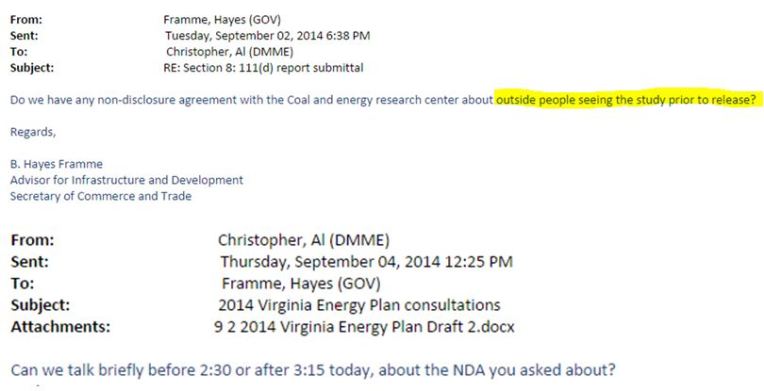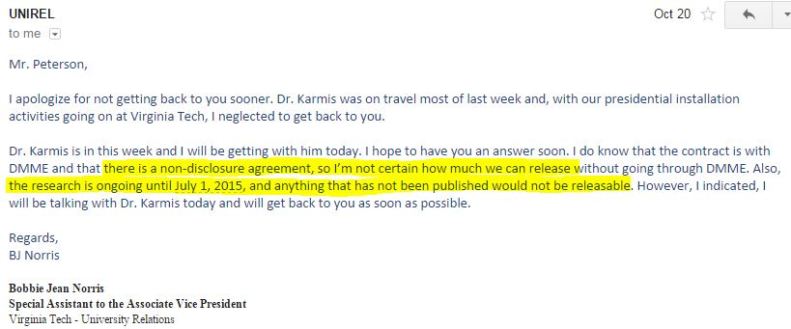Cross posted from The Checks and Balances Project. Written by Scott Peterson, Executive Director of The Checks and Balances Project

Professor Michael Karmis is evading basic questions about whether clean energy experts were consulted in his critical cost-benefit analysis of how Virginia can meet its federal Clean Power Plan (CPP) goals. This raises the possibility that Dr. Karmis, director of the Virginia Center for Coal and Energy Research, is shielding donors from legitimate public scrutiny.
The cost-benefit analysis was mandated by the legislature, is relied upon by the Governor, and is included in the Virginia Energy Plan. As we’ve reported before, Karmis is a curious choice to author this foundational document. The Clean Power Plan gives states wide  flexibility on how to meet standards. Logically, such an analysis should consider a variety of solutions to cut power plant pollution, including fast-growing renewable energy sources that have created 290,000 jobs in neighboring mid-Atlantic states in recent years.
flexibility on how to meet standards. Logically, such an analysis should consider a variety of solutions to cut power plant pollution, including fast-growing renewable energy sources that have created 290,000 jobs in neighboring mid-Atlantic states in recent years.
Yet, Karmis’s Coal Center is heavily oriented to only one, highly-polluting energy source – coal. The Center’s website lists a number of significant players in the coal industry as Sponsors that provide “generous financial contributions.” High ranking members of those same companies serve on the Center’s Advisory Board. Of its eight in-house “experts,” seven have strong financial ties to the coal industry – but none to clean energy sources.
State law mandated that Karmis’s Center be consulted, but not be the lead author of the analysis – a big difference in the level of power a coal-centric perspective would have in driving the process.
Evasion of Basic Questions
On Oct. 9, Karmis told me by phone in my only conversation with him, just as he was about to leave for a “site visit” to a West Virginia coal mine, that he had consulted renewable energy experts, but was unable to say who they were due to a nondisclosure agreement (NDA) signed with Virginia’s Dept. of Mines, Minerals and Energy (DMME). Professor Karmis said that if DMME’s Energy Director Al Christopher, who “coordinated” the study, gave him permission to tell me who he consulted with, then he would be “glad to tell me.” Unfortunately, several subsequent attempts to obtain that permission from Mr. Christopher went unanswered. Here’s an example:
The Plot Thickens
A Freedom of Information Act request sent to DMME on Sept. 29, 2014, produced records showing that an unusual non-disclosure agreement was the result of a request from a Mr. Hayes Fromme to Mr. Christopher. Fromme is an advisor to the Secretary of Commerce and Trade, and the McAuliffe Administration’s point person in creating the Energy Plan. The purpose was to prevent “outside people seeing the study prior to release.”
Professor Karmis, on the other hand, could see reasons of his own for a non-disclosure agreement. In the following Sept. 15 email, Karmis’s top aide John Craynon explains Professor Karmis had “already had a contact” about the cost-benefit analysis his Coal Center and hand-picked consultants were producing and wanted an NDA to “minimize what we need to say.”
In response to a FOIA I sent to Virginia Tech on Oct. 3, the justification for not providing me with the information I requested was the non-disclosure agreement.
Major Questions Remain
Is Professor Karmis shielding his Center’s coal industry donors from scrutiny about their involvement with the analysis of how Virginia can meet its Federal Clean Power Plan goals? If so, this is a highly inappropriate action.
It raises important questions about who hired Dr. Karmis to author the document, if others were allowed to bid, and how much Professor Karmis’s Coal Center was paid? More on that soon.
Scott Peterson
Executive Director







![Sunday News: “Trump Is Briefed on Options for Striking Iran as Protests Continue”; “Trump and Vance Are Fanning the Flames. Again”; “Shooting death of [Renee Good] matters to all of us”; “Fascism or freedom? The choice is yours”](https://bluevirginia.us/wp-content/uploads/2026/01/montage011126.jpg)
![VA DEQ: “pollution from data centers currently makes up a very small but growing percentage of the [NoVA] region’s most harmful air emissions, including CO, NOx and PM2.5”](https://bluevirginia.us/wp-content/uploads/2026/01/noxdatacenters.jpg)

![Thursday News: “Europe draws red line on Greenland after a year of trying to pacify Trump”; “ICE Agent Kills Woman, DHS Tells Obvious, Insane Lies About It”; “Trump’s DOJ sued Virginia. Our attorney general surrendered”; “Political domino effect hits Alexandria as Sen. Ebbin [to resign] to join Spanberger administration”](https://bluevirginia.us/wp-content/uploads/2026/01/montage010826.jpg)











